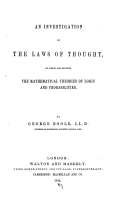Naming the Science of Probability
A distinguished writer [Siméon Denis Poisson] has thus stated the fundamental definitions of the science:
'The probability of an event is the reason we have to believe that it has taken place, or that it will take place.'
'The measure of the probability of an event is the ratio of the number of cases favourable to that event, to the total number of cases favourable or contrary, and all equally possible' (equally like to happen).
From these definitions it follows that the word probability, in its mathematical acceptation, has reference to the state of our knowledge of the circumstances under which an event may happen or fail. With the degree of information which we possess concerning the circumstances of an event, the reason we have to think that it will occur, or, to use a single term, our expectation of it, will vary. Probability is expectation founded upon partial knowledge. A perfect acquaintance with all the circumstances affecting the occurrence of an event would change expectation into certainty, and leave neither room nor demand for a theory of probabilities.
Notes:
A definition of the early field of mathematics.
Folksonomies: history mathematics probability
Taxonomies:
/science/mathematics/algebra (0.479964)
/science/mathematics (0.464748)
/science (0.391489)
Keywords:
Siméon Denis Poisson (0.907588 (positive:0.244058)), probability (0.826374 (positive:0.256873)), Probability A definition (0.801839 (neutral:0.000000)), word probability (0.741838 (negative:-0.229492)), early field (0.677907 (neutral:0.000000)), mathematical acceptation (0.667305 (neutral:0.000000)), fundamental definitions (0.665531 (neutral:0.000000)), event (0.659462 (positive:0.513957)), perfect acquaintance (0.659133 (positive:0.605033)), total number (0.631289 (negative:-0.237297)), single term (0.627770 (neutral:0.000000)), partial knowledge (0.616054 (neutral:0.000000)), expectation (0.612126 (positive:0.605033)), circumstances (0.583920 (positive:0.527753)), reason (0.525893 (positive:0.486364)), science (0.503067 (neutral:0.000000)), place (0.484876 (positive:0.486364)), cases (0.482623 (negative:-0.237297)), certainty (0.464583 (positive:0.605033)), probabilities (0.458970 (negative:-0.342104)), ratio (0.456214 (neutral:0.000000)), measure (0.453037 (neutral:0.000000)), mathematics (0.452187 (neutral:0.000000)), writer (0.448859 (positive:0.454411)), demand (0.448275 (negative:-0.342104)), occurrence (0.447728 (positive:0.605033)), reference (0.444599 (neutral:0.000000)), state (0.444527 (neutral:0.000000)), degree (0.443519 (positive:0.450473))
Entities:
Siméon Denis Poisson:Person (0.810068 (positive:0.244058)), writer:JobTitle (0.513165 (positive:0.454411))
Concepts:
Probability theory (0.976384): dbpedia | freebase | opencyc
Probability (0.681840): dbpedia | freebase
Mathematics (0.681325): dbpedia | freebase | opencyc
Random variable (0.631678): dbpedia | freebase
Event (0.629778): dbpedia | freebase
Probability space (0.569489): dbpedia | freebase
Scientific method (0.547486): dbpedia | freebase
Epistemology (0.502605): dbpedia | freebase | opencyc





